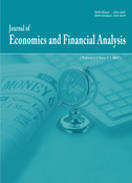URI: https://ojs.tripaledu.com/jefa/article/view/78/89
Oil Sector Revenues and the Marginal Propensity to Import: A Focus on Oil-Exporting African Countries
DOI: http://dx.doi.org/10.1991/jefa.v6i2.a56
Abstract
Keywords
JEL Classification
Full Text:
References
Alekhina, V. & Yoshino, N. (2018). Impact of world oil prices on an energy exporting economy including monetary policy. Asian Development Bank Institute Working Paper No 828
AL-Risheq, S.M. (2016). The impact of oil prices on industrial production in developing countries. An M.A. degree paper presented to the Department of Economics, University of Ottawa.
Aregbeyen, O. & Kolawole, B.O. (2015). Oil revenue, public spending and economic growth relationships in Nigeria. Journal of Sustainable Development, 8(3), 113-123.
Bala, U. & Chin, L. (2022). Increases in oil price or oil exports: which one is more positive on trade balance for African OPEC member countries? OPEC Energy Review, 47(1), 19-33. https://doi.org/10.1111/opec.12236
Bentour, E. (2021). Macro and sectoral implications of oil price decrease on oil-exporting countries. Arab Monetary Fund, United Arab Emirates.
Ebimobowei, A. (2022). Oil revenue and economic growth of Nigeria: 1990–2019. African Journal of Economics and Sustainable Development, 5(1), 17-46
Farhad, T., Yoshino, N., Rasoulinezha, E. & Chang, Y. (2019). Trade linkages and transmission of oil price fluctuations. Energy Policy, 133, 2-19.
Hamdi, H., & Sbia, R. (2013). Dynamic relationships between oil revenues, government spending and economic growth in an oil-dependent economy. Economic Modelling, 35(C), 118-125. DOI: 10.1016/j.econmod.2013.06.043
Haque, M.I. & Imran, M. (2020). Oil prices and terms of trade of Saudi Arabia: An empirical analysis. Journal of Asian Finance, Economics and Business, 7(9), 201–208.
Kriskkumar, K., Naseem, N.A. & Azman-Saini, W.N. (2022). Investigating the asymmetric effect of oil price on the economic growth in Malaysia: Applying augmented ARDL and nonlinear ARDL techniques. SAGE Open, 12(1), 1-17. DOI: 10.1177/21582440221079936
Olayungbo, D.O. & Umechukwu, C. (2022). Asymmetric oil price shocks and the economies of selected oil-exporting African countries: A global VAR approach. Economic Change and Restructuring, 55, pp. 2137-2170. https://doi.org/10.1007/s10644-022-09382-8
Ologunde, I.A., Kapingura, F.M. & Sibanda, K. (2020). Sustainable development and crude oil revenue: A case of selected crude oil-producing African countries. International Journal of Environmental Research and Public Health, 17(6799), 2-30, DOI:10.3390/ijerph17186799,
Rotimi, T.M.E. & Ngalawa, H. (2017). Oil price shocks and economic performance in Africa’s oil-exporting countries. Acta Universitatis Danubius, 13(5), 169-188.
Zakaria, Z. & Shamsuddin, S. (2017). Causality relationship between crude oil variables and budget variables in Malaysia. International Journal of Energy Economics and Policy, 7(2), 132-138.

This work is licensed under a Creative Commons Attribution-NonCommercial-NoDerivatives 4.0 International License.


